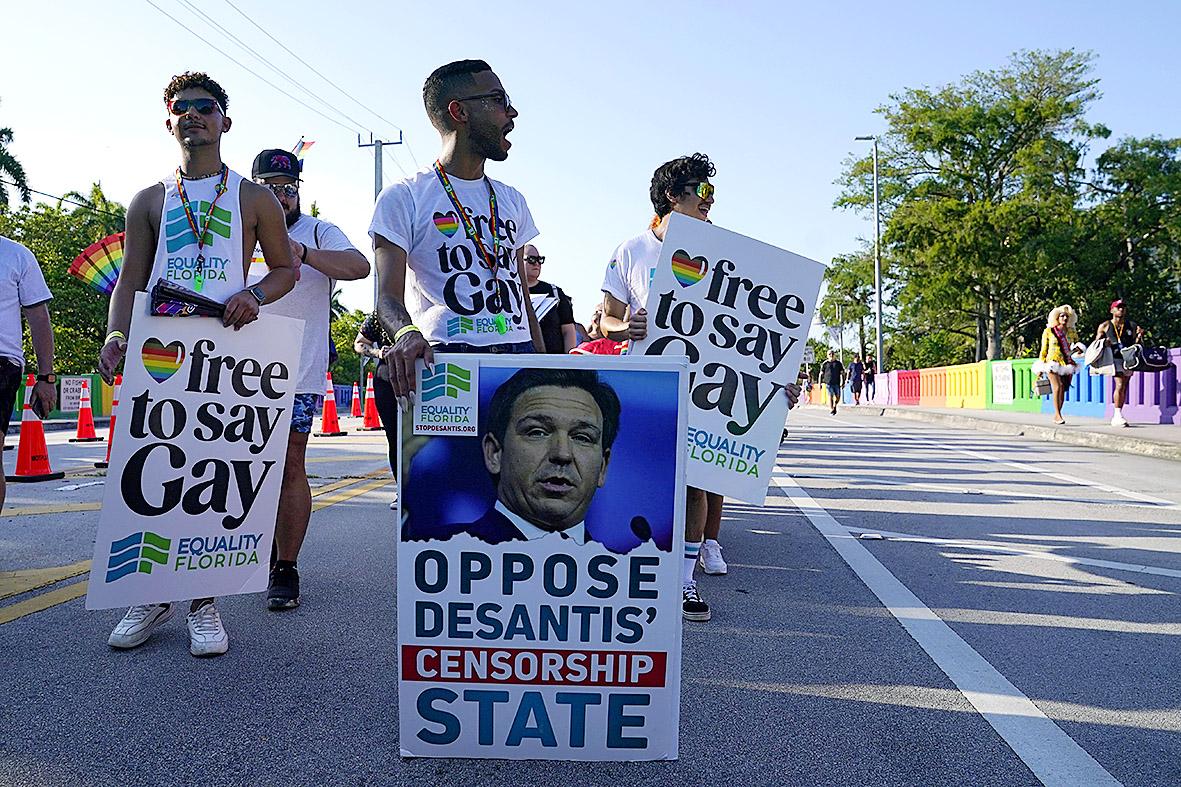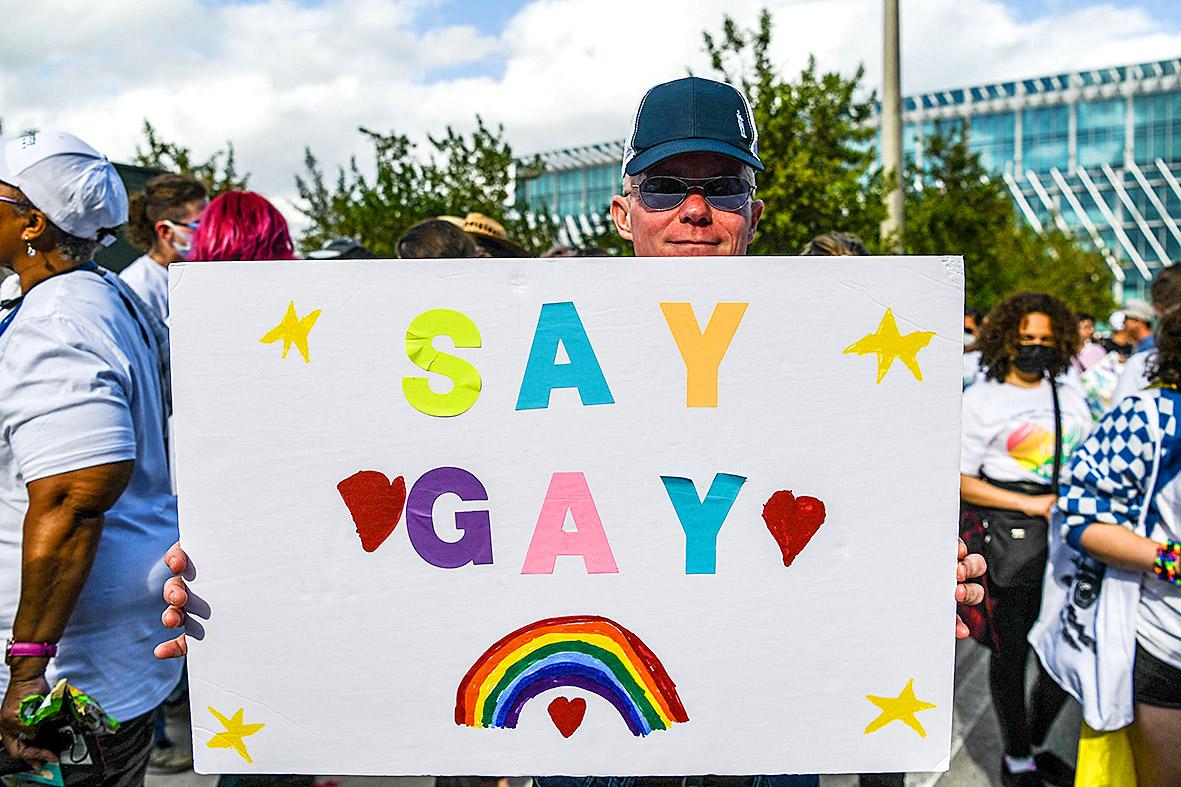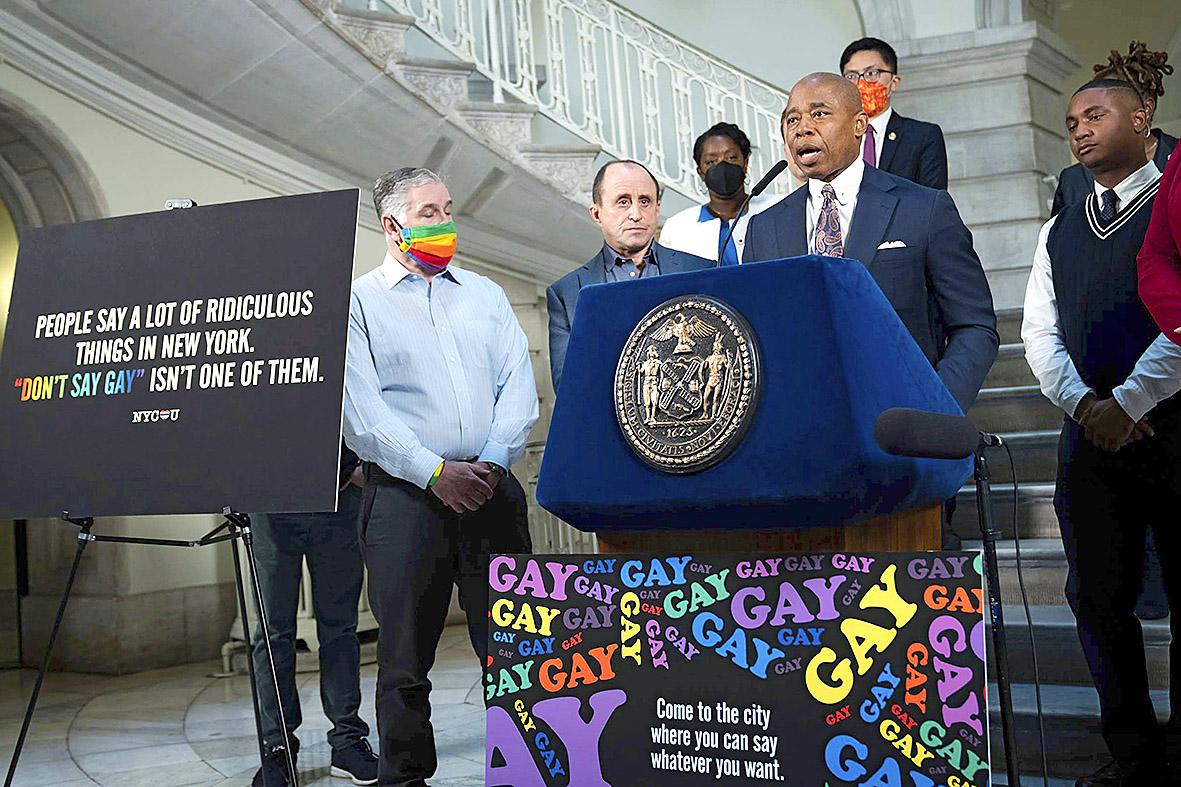Some Florida schools have moved library books and debated changing textbooks in response to a law critics call “Don’t Say Gay” — and some teachers have worried that family pictures on their desks could get them in trouble.
As students return from summer break, educators are cautiously adjusting and waiting to see how the new law governing lessons on gender and sexual orientation will be interpreted and enforced.
The new law, championed by Florida’s Republican Gov. Ron DeSantis, bans lessons on sexual orientation and gender identity in kindergarten through third grade as well as material that is not deemed age-appropriate. Most educators do not expect a major change in lesson plans — one of the key reasons critics cited in saying the law was unnecessary was that teachers do not cover such subjects in early grades anyway.

Photo: AP
But some worry it sets a tone that will leave LGBTQ teachers and kids feeling ostracized.
“The messaging of this law is horrible. It’s toxic, it’s discriminatory,” said Gretchen Robinson, a lesbian high school teacher in Orange County. “It targets, very obviously, LGBTQ students, it ‘others’ them, and that is not OK.”
NATIONWIDE DEBATE

Photo: AFP
Workshops about the law that her school district’s legal team held over the summer caused confusion. Some staff said they were told teachers in kindergarten through third grade could not display pride flags or photos of their same-sex spouses. The district later said the law only applied to classroom instruction and that the photos were allowed. It apologized for offering bad guidance with a hypothetical discussion.
Robinson said schools in her area had given out rainbow-colored lanyards and inclusion stickers, but she was not sure whether teachers would continue to wear or display them. She also worried that some teachers will “err on the side of caution and leave stuff out” during lessons.
The law attracted widespread attention and condemnation earlier this year when it worked its way through the Republican-controlled Statehouse. Critics dubbed it “Don’t Say Gay,” though it contains no bans on specific phrases and doesn’t bar material on sexual orientation considered age-appropriate for grades four and above.

Photo: AP
Opponents say the law would stifle classroom discussion, arguing that it doesn’t clarify what could be deemed inappropriate. It also establishes an enforcement mechanism that invites parents to file lawsuits against districts, potentially heightening tensions between conservatives and school officials.
The Florida debate reflects one that is playing out nationwide, with fights in school boards and state legislatures over what and how children learn about race, gender, sexual orientation and American history. DeSantis and other Republicans have argued parents should be the ones in control of teaching their children about sexual orientation and gender identity.
DeSantis recently addressed some of the concerns at an unrelated news conference, saying: “You know, you teach reading, math, science, the basic stuff. And you don’t teach gender ideology, [critical race theory], the sexuality in the elementary schools. That’s not very difficult to know and that’s not very difficult to understand,” he said.
NO CLEAR EXPLANATION
Educators say the state Department of Education has not yet explained clearly how the law will be enforced. In June the agency issued a memo on the law to school district superintendents, but it mostly contained a copy and paste of the legislative text.
“The guidance we’re giving people is that it is confusing and we don’t know how it’s going to be interpreted. But what we can do is care for kids and provide the good learning environment that they deserve,” said Andrew Spar, president of the Florida Education Association union.
The law has been at the heart of a discussion over sex education materials in Miami-Dade County, which has the state’s largest school system. Some school board members said new textbooks showed pictures of condoms, diaphragms and intrauterine devices that were too graphic for middle school students.
When school officials sought the board’s approval for the new textbooks in April, after the law had passed, administrators said they would remove chapters that cover gender identity and sexuality. The board members approved the online textbooks, but then reversed their decision last month after coming under public pressure. The board reversed itself again last week to adopt the textbooks without the chapters on gender identity and sexuality.
In Palm Beach County, school officials say they reviewed books and have moved only a handful to a separate section not accessible to children in third grade and younger.
In various school districts, teachers have said they are worried about parents filing complaints over perceived violations while there’s still not much clarity around the new law.
Norma Schwartz, mother of a fifth grader and an eighth grader in Miami-Dade schools, said the law may cause some students, families and teachers to feel targeted.
“It goes against our mission and vision, to empower all children, not make them feel like they don’t belong,” said Schwartz, who is part of the Miami-Dade County Council PTA, which has opposed the law. “As far as parental rights, we are the PTA. We have been around for 100 years. We want parental engagement, we want to empower parents.”

On April 26, The Lancet published a letter from two doctors at Taichung-based China Medical University Hospital (CMUH) warning that “Taiwan’s Health Care System is on the Brink of Collapse.” The authors said that “Years of policy inaction and mismanagement of resources have led to the National Health Insurance system operating under unsustainable conditions.” The pushback was immediate. Errors in the paper were quickly identified and publicized, to discredit the authors (the hospital apologized). CNA reported that CMUH said the letter described Taiwan in 2021 as having 62 nurses per 10,000 people, when the correct number was 78 nurses per 10,000

As Donald Trump’s executive order in March led to the shuttering of Voice of America (VOA) — the global broadcaster whose roots date back to the fight against Nazi propaganda — he quickly attracted support from figures not used to aligning themselves with any US administration. Trump had ordered the US Agency for Global Media, the federal agency that funds VOA and other groups promoting independent journalism overseas, to be “eliminated to the maximum extent consistent with applicable law.” The decision suddenly halted programming in 49 languages to more than 425 million people. In Moscow, Margarita Simonyan, the hardline editor-in-chief of the

Six weeks before I embarked on a research mission in Kyoto, I was sitting alone at a bar counter in Melbourne. Next to me, a woman was bragging loudly to a friend: She, too, was heading to Kyoto, I quickly discerned. Except her trip was in four months. And she’d just pulled an all-nighter booking restaurant reservations. As I snooped on the conversation, I broke out in a sweat, panicking because I’d yet to secure a single table. Then I remembered: Eating well in Japan is absolutely not something to lose sleep over. It’s true that the best-known institutions book up faster

Though the total area of Penghu isn’t that large, exploring all of it — including its numerous outlying islands — could easily take a couple of weeks. The most remote township accessible by road from Magong City (馬公市) is Siyu (西嶼鄉), and this place alone deserves at least two days to fully appreciate. Whether it’s beaches, architecture, museums, snacks, sunrises or sunsets that attract you, Siyu has something for everyone. Though only 5km from Magong by sea, no ferry service currently exists and it must be reached by a long circuitous route around the main island of Penghu, with the